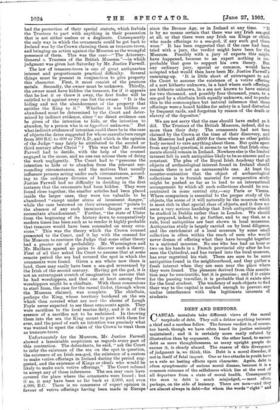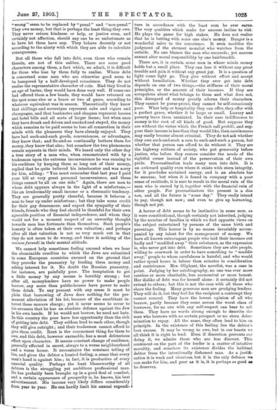DEBT AND DEBTORS.
CASUAL moralists take different views of the moral turpitude of debt. They call a debtor anything between a thief and a careless fellow. The former verdict is, of course, too harsh, though we have often heard its justice seriously maintained ; and it is certainly more easily refuted by illustration than by argument. On the other hand, to excuse debt as mere thoughtlessness, as many upright people do excuse it, is clearly absurd. The reason of this divergence of judgment is, we think, this. Debt is a moral disorder, if not in itself of fatal import. One or two attacks in youth have as a rule no lasting effects upon character. Again, debt is often symptomatic of serious moral disease, because it is a common outcome of the selfishness which lies at the root of all departure from a state of moral health. Consequently the man in debt is much misjudged, — most often, perhaps, on the side of leniency. There are men—and they are almost always in debt—for whom the words " right " and
a wrong " seem to be replaced by " penal" and "non-penal." They owe money, but that is perhaps the least thing they owe. They never return kindness or help, or justice even, and certainly not affection, should any one be so unfortunate as to have let them have any. They behave decently or not according to the nicety with which they are able to calculate consequences.
But all those who fall into debt, even those who remain therein, are not of this calibre. There are some good characters among them, a fact which, we admit, it is difficult for those who lose by them fully to realise. Where debt is concerned some men who are otherwise good seem to be hampered by a half-developed conscience. They do not realise the representative character of coin. Had they lived in an age of barter, they would have done very well. If some one had offered them a few beads, they would have returned on the spot some rice or a brace or two of game, according to whatever equivalent was in season. Theoretically they know that shillings and sovereigns represent cabs and cigars and champagne, and that banknotes and cheques represent houses and hotel bills and all sorts of larger items ; but when once they have drunk and driven and smoked and stayed, the money which remains to be paid seems to lose all connection in their minds with the pleasures they have already enjoyed. They have had such-and-such goods, conveniences, or advantages, they know that; and So-and-so continually bothers them for money, they know that also; but somehow the two phenomena remain separate in their minds. We heard only the other day a true story of a man who, when remonstrated with by a tradesman upon the extreme inconvenience he was causing to his creditors by keeping them so long out of their money, replied that he quite believed his interlocutor and was sorry for him, adding : "You must remember that last year I paid your bill at very great personal inconvenience, and these things cannot be all on one side." Again, there are men to whom debt appears always in the light of a misfortune,— like an irredeemably small income or a rheumatic tendency. They are generally pretty cheerful, because it behoves a man to bear up under misfortune; but they take some credit for their gay demeanour, and expect the sympathy of their friends, friends who they feel should be thankful for their own agreeable position of financial independence, and whom they would not for a moment suspect of an unworthy thought towards men less fortunate than themselves. Such people's honesty is often taken at their own valuation ; and perhaps after all that valuation is not so very much out in that they do not mean to do wrong, and there is nothing of the animus furendi in their mental attitude.
We cannot help sometimes feeling amused when we hear the abominable cruelties to which the Jews are submitted in some European countries excused on the ground that they provoke the peasantry by lending them money and asking interest for it. No doubt the Russian peasantry, for instance, are painfully poor. The temptation to get a little money by any means is horribly strong ; but after all, moneylenders have no power to make people borrow, any more than public-houses have power to make them drink. To any peasant with any sense it must be plain that borrowing of Jews does nothing for the per- manent alleviation of his lot, because of the exorbitant in- terest these usurers charge; yet it never seems to occur to his excusers that he has an absolute defence against the Jew in his own hands. If he would not borrow, he need not hate. In this country the poor have less opportunity than the rich of getting into debt. They seldom lend to each other, though they will give outright ; and their tradesmen cannot afford to give them credit. Rent is the commonest thing for them to owe, and this debt, however excusable, has a most deleterious effect upon character. It means constant change of residence, generally effected in secret, always to a worse neighbourhood and a worse house. It necessitates the constant telling of lies, and gives the debtor a hunted feeling, a sense that every man's hand is against him ; in fact, it is productive of every unsocial quality. Perhaps the least blameworthy of all debtors is the struggling yet ambitious professional man. He has probably been brought up in a good deal of comfort, and a certain appearance of prosperity is, he knows, his best advertisement. His income very likely differs considerably from year to year. He can hardly limit his annual expendi-
ture in accordance with the least sum he ever earns. The very qualities which make for success incline to risk. He plays the game for high stakes. He does not realise that he is betting with some one else's money. Danger is a wonderful salve to the conscience. It even modifies the judgment of the sternest moralist who watches from the outside. No one blames the man who succeeds ; yet success cannot alter moral responsibility by one hairbreadth.
There are, it is certain, some men in whose minds money holds but a small place. They can lose it without any great trouble and gain it without any great joy. It is a question of light come light go. They give without effort and accept without humiliation. Whether they ever get into debt depends on one of two things,—the stiffness of their moral principles, or the amount of their incomes. If they are scrupulous about what belongs to them and what does not, this disregard of money greatly adorns their characters. They cannot be purse-proud, they cannot be self-consciously poor. What help or hospitality they can offer, they offer with a perfect grace, whether it be large or small. Luxury and poverty leave them untainted. In their case indifference to money is the root of all kinds of good. But suppose they are without the virtue which the French call probite, and sup- pose their income is less than they would like, then carelessness may easily become almost criminal. They do not ask whether they owe such-and-such a sum to such-and-such a person, but whether that person can afford to do without it. They are the highway robbers of society, who put generosity before justice, who before they restore consider the needs of the rightful owner instead of the preservation of their own pride. Procrastination leads many men into debt. It is an awkward quality even where it exists with stern integrity, for it precludes sustained energy, and is an absolute bar to success; but when it is found in company with a poor sense of rectitude, it is sure to result in the moral ruin of the man who is cursed by it, together with the financial ruin of other people. For procrastinators the present is a dies non, and all the future is " some day." They really intend to pay, though not now ; and even to give up borrowing, though not yet.
A horror of debt seems to be instinctive in some men, as it were constitutional, though certainly not inherited, judging by the number of families in which we find opposite views on the subject entertained by persons of the same birth and parentage. This horror is by no means invariably accom- panied by any talent for the management of money. We have all known extravagant people who laid their incomes out badly and "muddled away" their substance, as the expression is, who never got into debt. Sometimes they are able people, willing to overwork in order to have something to " muddle away," people to whom carefulness is hateful, and who would rather spend hours in labour than minutes in consideration and contrivance. Mrs. Oliphant, the novelist, was a case in point. Judging by her autobiography, no one was ever more careless or more charitable, less economical or more honest. Her dislike of debt was for herself alone : it certainly did not extend to others ; but this is not the case with all those who share the feeling. Many generous men are grudging lenders. They will do it, but they feel for the recipient a contempt they cannot conceal. They have the lowest opinion of all who borrow, partly because they come across the worst class of borrower, for no one with any self-respect can bear to ask them. They have no words strong enough to describe the man who borrows with no certain prospect or no stern deter- mination to repay. All the same, they often lend to him on principle. In the existence of this feeling lies the debtor's best excuse. It may be wrong to owe, but in our hearts we all think it is right to lend. Even if discretion prevents our doing it, we admire those who are less discreet. This sentiment on the part of the lender is a matter of intuitive morality, and somehow its existence divides the habitual debtor from the intentionally dishonest man. As a justifi- cation it is weak and vicarious, but it is the only defence we can make for him, and poor as it is, it is perhaps as good as he deserves.























































 Previous page
Previous page